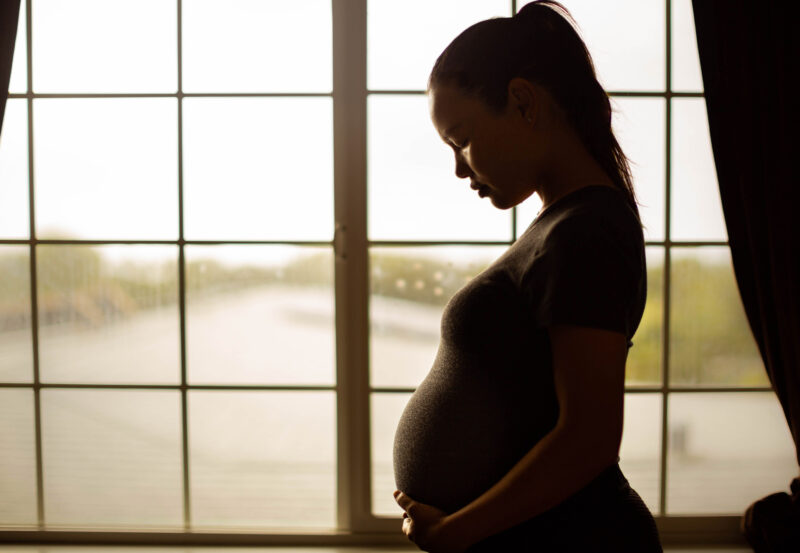 Pregnancy is a joyous, celebratory time, but for many new moms, it can also be a very distressing and difficult time.
Pregnancy is a joyous, celebratory time, but for many new moms, it can also be a very distressing and difficult time.
From the moment a woman discovers she’s pregnant, she is often faced with immense biological, emotional, financial and social changes. Then once baby arrives, a woman must recover physically from childbirth and adapt to changing hormones, all the while learning to feed and care for her newborn — around the clock.
As any mom knows, having a baby brings about enormous change — both before and after baby’s born. That’s why doctors are changing the conversation around the importance of maternal mental health starting at conception, rather than at childbirth, as we often hear about in the form of postpartum depression.
“Attachment to baby starts in utero, so the window for maternal mental health is much larger than previously talked about,” said Dr. Mallory Zehe, a pediatric psychologist in Akron Children’s Maternal Fetal Medicine Center. “What we know through research is maternal mental health is important at conception, throughout pregnancy, and in the postpartum period through one year after delivery because it has a range of implications for mom and baby over time. When mom experiences a mental health concern, we can see effects on growth and development of baby.”
According to Postpartum Support International, up to 20 percent of women develop perinatal mood and anxiety disorders, known as PMADs, during pregnancy and in the first year after delivery. But since the COVID-19 pandemic, it’s estimated that number has increased to nearly 50 percent of women, due to an increased burden of childcare, interrupted work schedules, isolation from social support, impacted labor and delivery environments, exposure concerns and the list goes on.
While all women can develop PMADs, a number of social determinants, such as socioeconomic status, race/ethnicity and a lack of social support, can increase a woman’s risk.
Dr. Zehe sheds light on PMADs and common symptoms to help moms identify a disorder earlier, prior to baby’s arrival, so she can decrease symptoms, improve her quality of life and better support her baby before and after delivery. PMADs don’t resolve on their own and if left untreated, they can get worse and affect baby’s development.
“A mood disorder can impact mom’s ability to bond with baby,” she said. “If mom is feeling sad or anxious, it can be difficult for her to take care of her own needs, let alone the needs of her baby.”
PMADs vs. baby blues
The baby blues, a term used to describe the worry, sadness and tiredness many women experience after delivery, are extremely common and occur in up to 80 percent of women. So, many new moms are left wondering: Am I suffering from the baby blues or something more serious?
The baby blues are not a mild form of depression and should subside a few days after birth. Moms with the baby blues are still predominately happy and their confidence in caring for their baby is unchanged. However, symptoms of PMADs are much more intense and last longer than those of the baby blues.

The baby blues are not a mild form of depression and should subside a few days after birth. Symptoms of PMADs are much more intense and last longer than the baby blues.
Common symptoms for PMADs include:
- Feeling depressed, hopeless or disconnected from baby
- Crying more often than usual
- Withdrawing from loved ones
- Brain fog or trouble concentrating
- Feeling anxious or panicky
- Dizziness or heart palpitations
- Sleep disturbances and loss of energy
- Extreme worries or fears, especially about the health and safety of your baby
- Scary or unwanted thoughts, such as harming yourself or your baby
What to do if you think you’re experiencing PMADs
It’s vital to get help for PMADs at the first sign of symptoms. PMADs can lead to poor prenatal care, insufficient nutrition, an increased risk of substance abuse and expose baby in utero to stress hormones. All of these factors can lead to preterm labor and low birth weight.
Once baby is born, PMADs can impact a mom’s ability to interact with and care for her newborn, negatively affecting baby’s development and potential for optimal growth.
The good news is PMADs are highly treatable and most women see a significant improvement of symptoms, Dr. Zehe said.
Treatment for PMADs is focused on mom’s well-being so she can be at her best to support her baby. A therapist will help moms identify, understand and alter their thoughts and feelings that influence negative behaviors and emotions.

If you think you’re suffering from PMADs, confide in a loved one and seek mental health services. You can start with your obstetrician-gynecologist for a referral.
If you think you’re suffering from PMADs, confide in a trusted loved one for support and seek mental health services.
A good place to start is with your obstetrician-gynecologist. Your provider can help you first, focus on meeting your most basic needs: nutrition, sleep and personal hygiene, and then refer you to a therapist with perinatal services.
Akron Children’s Maternal Fetal Medicine Center offers mental health treatment to current patients and moms who have babies in the NICU. They also can offer other local resources to help you find services to support your mental health once you’re at home with baby.
“The most important thing I remind my patients is that mental health concerns related to pregnancy and birth commonly exist and are treatable,” said Dr. Zehe. “Seeking help does not demonstrate weakness or an inability to care for your child; rather, it’s the opposite. Optimizing your own mental health can not only improve your quality of life, but also improve your baby’s development.”
The Akron Children’s psychology, MFM and NICU collaboration for maternal mental health is currently available to Akron Children’s MFM patients and moms who have babies in Akron Children’s NICU. Established patients can ask their MFM or NICU providers for more information about this service. For all others, contact Akron Children’s Behavioral Health at 330-543-5015 for more information.










